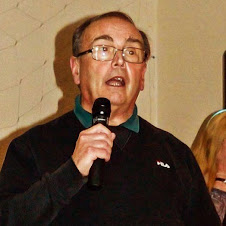This is yet another scoop for Rhymes and Routes! At short
notice, and at some inconvenience to himself, President Vladimir Putin of
Russia has agreed to write the Rhymes and Routes Christmas message this year.
Comments in brackets are by me – signed “B” for Blogmeister – otherwise, no
changes have been made to President Putin’s text, even when he is critical of
Rhymes and Routes.
Zdrastvootye!
I am very glad to be writing Rhymes and Routes Christmas message, as the British
newspapers never publish anything I send them, despite my articles being so brilliant
and perceptive. As you can see, I am wearing my party hat, as I am very busy
getting ready for the Kremlin Staff Christmas Party (That’s a party never
banned in Russia!-B), and I think it show the lighter side of my nature.
I
wish to extend Christmas greetings from all the people of Russia to the whole
of Great Britain. Relations between us have been strained in recent times, but
I wish to assure the British people that I bear no animosity towards them,
despite their leaders and their interference in the Ukraine. I have been much
misrepresented as an aggressor in this matter, but it is not fair. As that
outstanding Angliski politician, Nigel Farage, a man who admires me greatly, has said, it was the Ukrainian fascists, with western support, who overturned a democratically elected Prime
Minister, and replaced him with a nationalist puppet. Mr Farage is a man with whom I could do business; I hope he becomes UK Prime Minister.
There
is lot of nonsense talked about me and my country in Western media. One of our
many detractors, the Guardian journalist, Luke Harding, has written a
scurrilous book called “Mafia State”, where he makes many unfounded accusations.
I only wish he would back to Russia for visit, as I need a new judo partner.
Even Mr Harding, though, praises me for presenting a positive image of my
country to the world. As he rightly say, I spend more on the “Russia Today”
channel than I do on social welfare programmes (er, well, Mr President…B).
My critics point to the fact that 56 journalists have been murdered in Russia since the early 90s – as is it were my fault! Anyone (especially Georgians, Chechens and Ukrainians – B) knowing me will tell you that I am far too busy to go round liquidating a bunch of pen pushers. If I did that sort of thing, would Luke Harding have left Russia alive? (I bet he locks his doors at night! – B) No, Russia is now a democracy, which allows legitimate protest. As an example – did we not release those anarchist harridans, Pussy Riot, from jail? Even after they blasphemously disrupted an Orthodox Church service, they were released from incarceration. I myself am a devout Orthodox believer, but I believe in free
speech.
In the old days, in USSR, the Pussy Riot protest
would not have happened, as there were no churches and no protests. I have to
admit that I sometimes stand at the window of my office in the Kremlin,
listening to Barbra Streisand singing “The Way We Were” on my iPod, and a
little tear comes to my eye when I think back to those far-gone, happy times
(What a touching image! – B).
To
conclude this Christmas message, I would like to address the two contributors
to this blog: Rednev and Blogmeister. My Friendly Security Boys – FSB (It really means Federal Security Bureau - B)– have checked
out both men carefully, and so I invite Rednev to come and sing at the Kremlin
Folk Club Christmas Party. I offer him a 20 minute slot between Igor, the
Whistling Tractor Driver from Tobolsk and the Under-21 Moscow Folk Dance
Society. Please get in touch, Neville. As for Blogmeister, the FSB say he think
of himself as a songwriter and poet – I offer him example of VladimirMayakovsky (He shot himself in 1930 – thanks, Mr President. B) and from what I
see of his prose writing ability, he, too can come to the party – to write the menu.
Anyway, I must return to work on Staff Party – I need to parcel up my presents.
To the British people from the Russian people: с рождеством! –
Merry Christmas!
Many thanks, Mr President, on behalf
of the people of Britain. I don’t know if Neville will take up your offer, but
I’ll pass it on. I must decline your offer to write the menu for the Folk Club
Party, as, examining your message in detail, you are perfectly capable of
writing badly yourself. Anyway, I can’t write in Russian. As for what you say
in your message, readers must draw their own conclusions!











